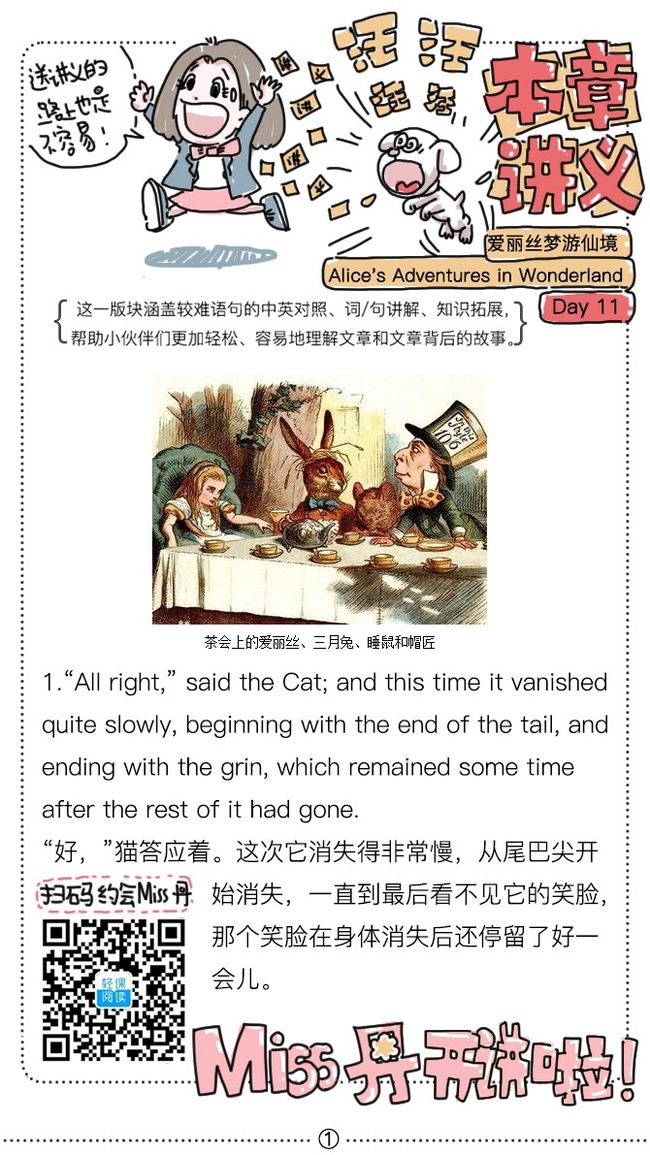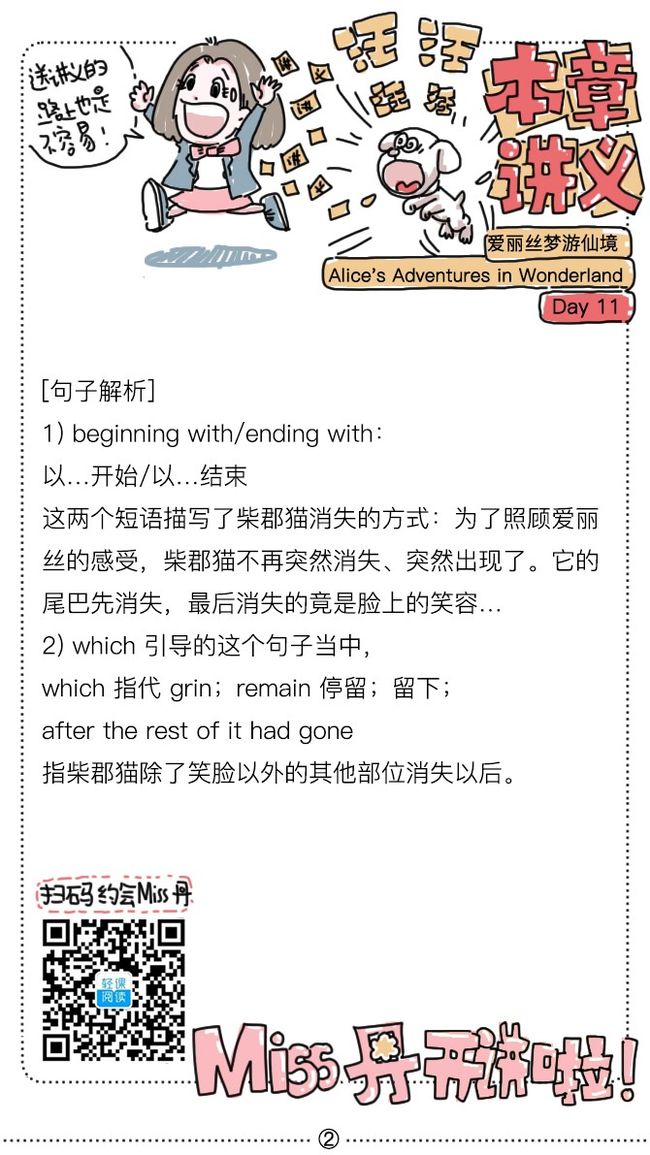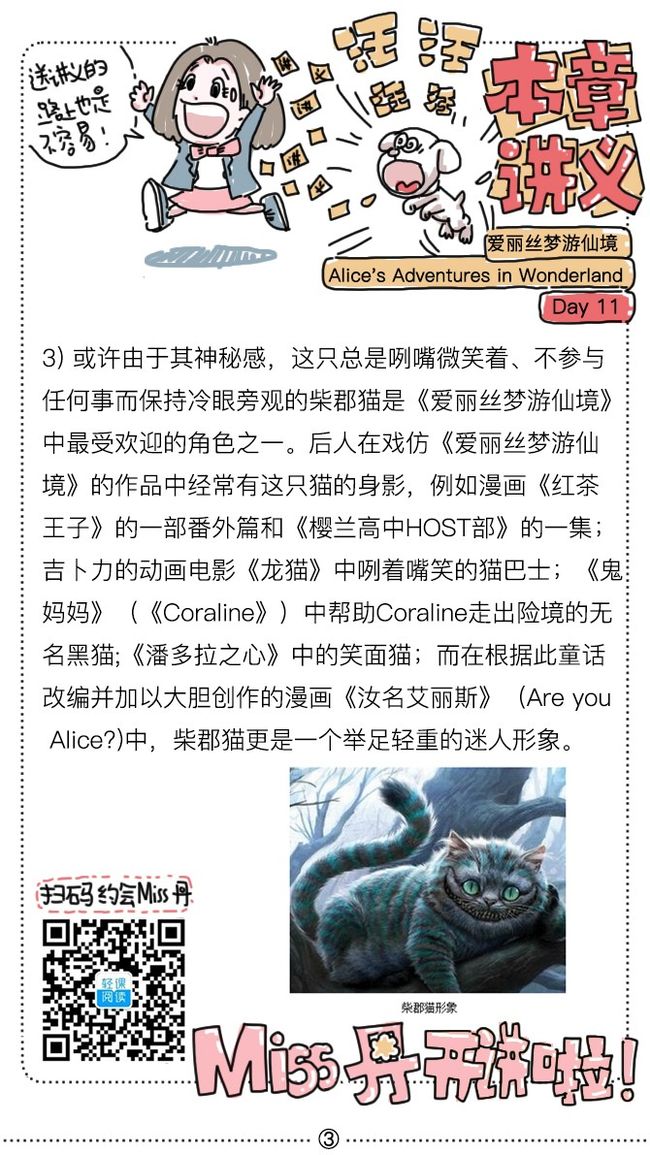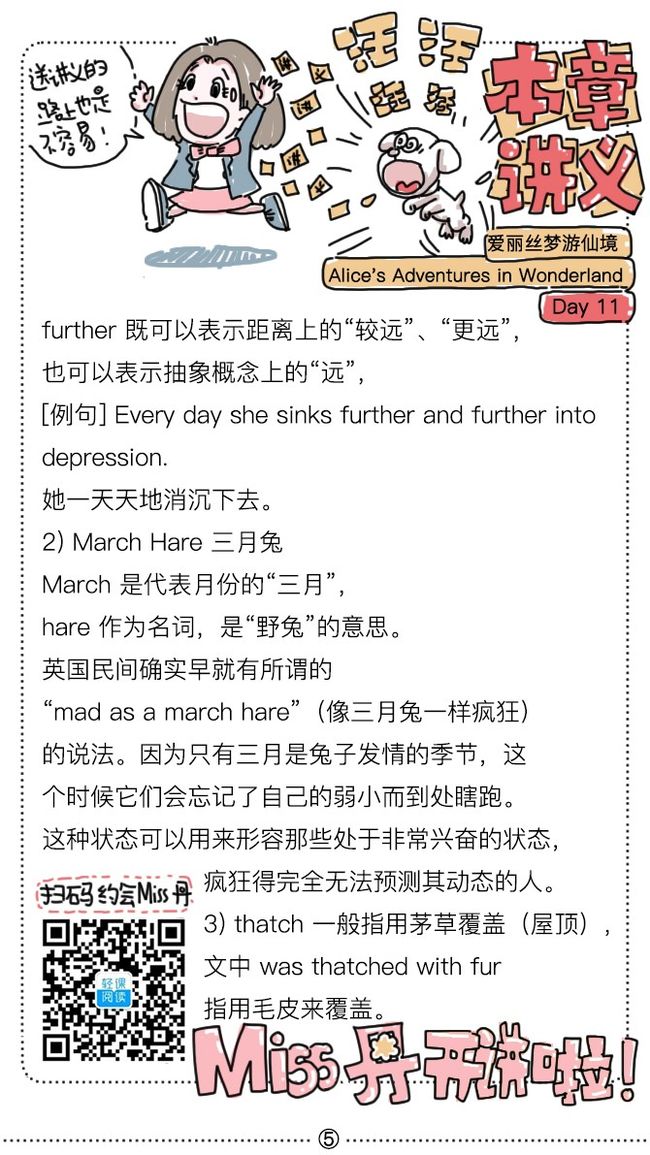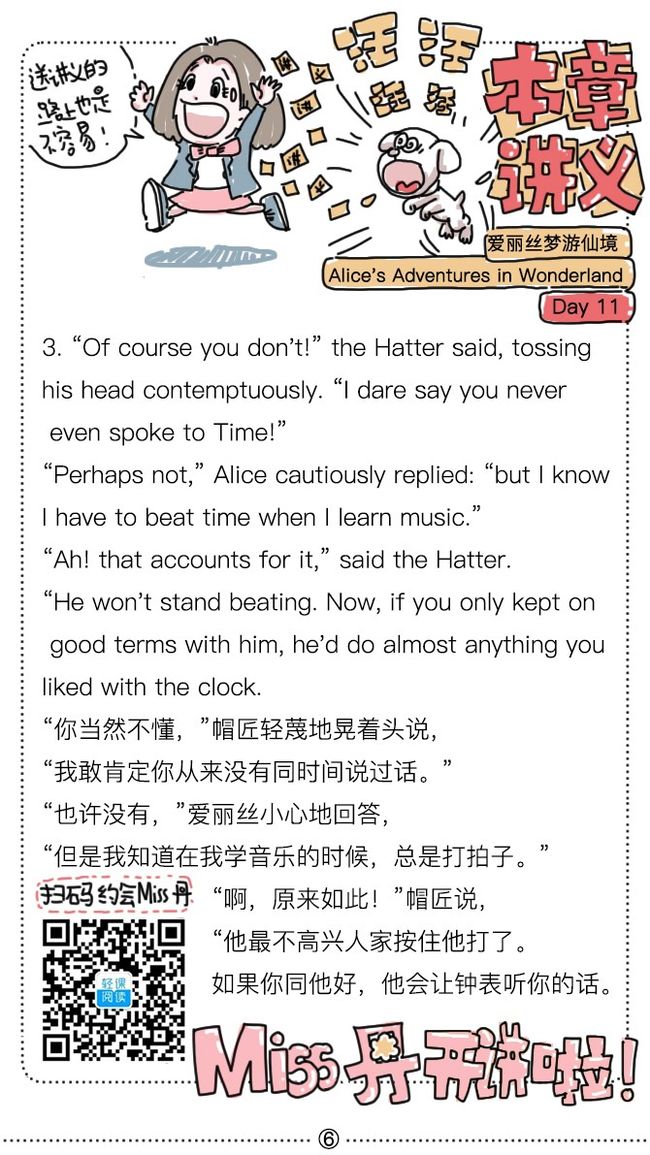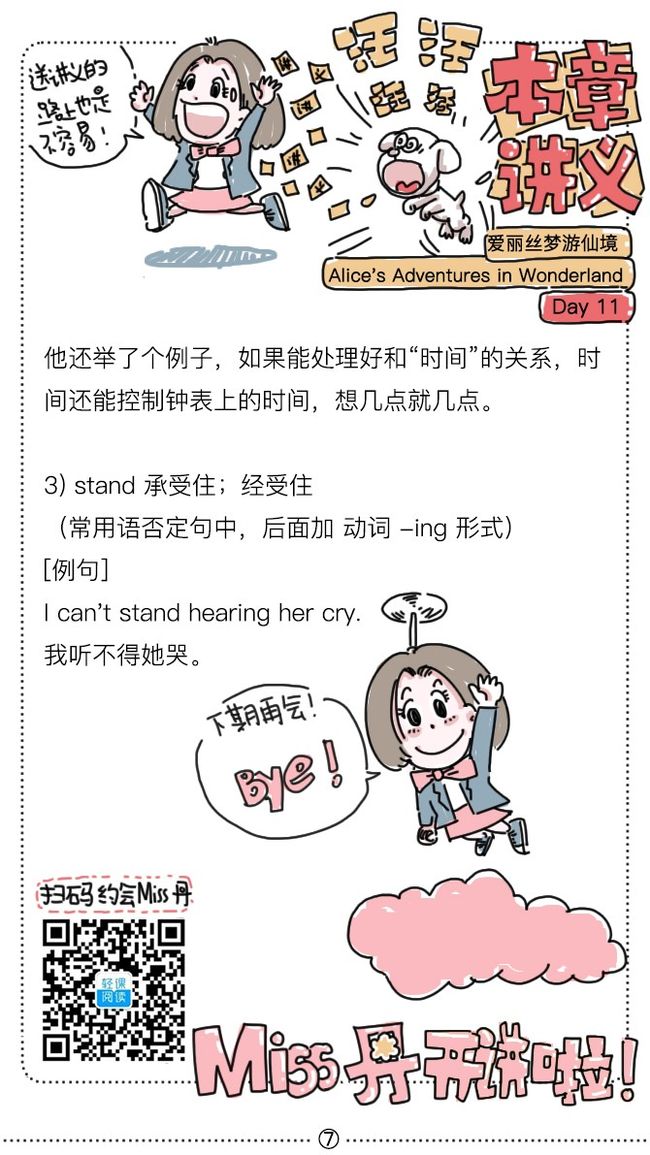Alice didn't think that proved it at all; however, she went on, "And how do you know that you're mad?"
"To begin with," said the Cat, "a dog's not mad. You grant (承认) that?"
和猫对话小.jpg
"I suppose so," said Alice.
"Well, then," the Cat went on, "you see, a dog growls (咆哮) when it's angry, and wags its tail when it's pleased. Now I growl when I'm pleased, and wag my tail when I'm angry. Therefore I'm mad."
"I call it purring (咕噜咕噜声), not growling," said Alice.
"Call it what you like," said the Cat. "Do you play croquet with the Queen to-day?"
"I should like it very much," said Alice, "but I haven't been invited yet."
"You'll see me there," said the Cat, and vanished (消失).
Alice was not much surprised at this, she was getting so used to queer things happening. While she was looking at the place where it had been, it suddenly appeared again.
"By-the-bye (顺便问一下), what became of the baby?" said the Cat. "I'd nearly forgotten to ask."
"It turned into a pig," Alice quietly said, just as if it had come back in a natural way.
"I thought it would," said the Cat, and vanished again.
Alice waited a little, half expecting to see it again, but it did not appear, and after a minute or two she walked on in the direction in which the March Hare (三月兔) was said to live.
"I've seen hatters before," she said to herself; "the March Hare will be much the most interesting, and perhaps as this is May it won't be raving (完全) mad--at least not so mad as it was in March." As she said this, she looked up, and there was the Cat again, sitting on a branch of a tree.
"Did you say pig, or fig?" said the Cat.
"I said pig," replied Alice; "and I wish you wouldn't keep appearing and vanishing so suddenly: you make one quite giddy (眼花的)."
"All right," said the Cat; and this time it vanished quite slowly, beginning with the end of the tail, and ending with the grin, which remained some time after the rest of it had gone.
"Well! I've often seen a cat without a grin," thought Alice; "but a grin without a cat! It's the most curious thing I ever saw in my life!"
She had not gone much farther before she came in sight of the house of the March Hare: she thought it must be the right house, because the chimneys were shaped like ears and the roof was thatched with fur.
It was so large a house, that she did not like to go nearer till she had nibbled some more of the left hand bit of mushroom, and raised herself to about two feet high: even then she walked up towards it rather timidly, saying to herself "Suppose it should be raving mad after all! I almost wish I'd gone to see the Hatter instead!"
There was a table set out under a tree in front of the house, and the March Hare and the Hatter were having tea at it: a Dormouse (睡鼠) was sitting between them, fast asleep, and the other two were using it as a cushion (垫子), resting their elbows on it, and talking over its head. "Very uncomfortable for the Dormouse," thought Alice; "only, as it's asleep, I suppose it doesn't mind."
The table was a large one, but the three were all crowded together at one corner of it: "No room! No room!" they cried out when they saw Alice coming. "There's plenty (充足) of room!" said Alice indignantly (愤怒地), and she sat down in a large arm-chair at one end of the table.
"Have some wine," the March Hare said in an encouraging tone.
Alice looked all round the table, but there was nothing on it but tea. "I don't see any wine," she remarked.
"There isn't any," said the March Hare.
三月兔对话小.jpg
"Then it wasn't very civil (有礼貌的) of you to offer it," said Alice angrily.
"It wasn't very civil of you to sit down without being invited," said the March Hare.
"I didn't know it was your table," said Alice; "it's laid for a great many more than three."
"Your hair wants cutting," said the Hatter. He had been looking at Alice for some time with great curiosity, and this was his first speech.
"You should learn not to make personal remarks," Alice said with some severity (严厉); "it's very rude."
The Hatter opened his eyes very wide on hearing this; but all he said was, "Why is a raven (乌鸦) like a writing-desk?"
"Come, we shall have some fun now!" thought Alice. "I'm glad they've begun asking riddles (谜语). --I believe I can guess that," she added aloud.
"Do you mean that you think you can find out the answer to it?" said the March Hare.
"Exactly so," said Alice.
"Then you should say what you mean," the March Hare went on.
"I do," Alice hastily replied; "at least--at least I mean what I say--that's the same thing, you know."
"Not the same thing a bit!" said the Hatter. "You might just as well say that 'I see what I eat' is the same thing as 'I eat what I see'!"
"You might just as well say," added the March Hare, "that 'I like what I get' is the same thing as 'I get what I like'!"
"You might just as well say," added the Dormouse, who seemed to be talking in his sleep, "that 'I breathe when I sleep' is the same thing as 'I sleep when I breathe'!"
"It is the same thing with you," said the Hatter, and here the conversation dropped, and the party sat silent for a minute, while Alice thought over all she could remember about ravens and writing-desks, which wasn't much.
The Hatter was the first to break the silence. "What day of the month is it?" he said, turning to Alice: he had taken his watch out of his pocket, and was looking at it uneasily, shaking it every now and then, and holding it to his ear.
Alice considered a little, and then said "The fourth."
"Two days wrong!" sighed (叹气) the Hatter. "I told you butter wouldn't suit the works!" he added looking angrily at the March Hare.
"It was the best butter," the March Hare meekly (温顺地) replied.
"Yes, but some crumbs (面包屑) must have got in as well," the Hatter grumbled: "you shouldn't have put it in with the bread-knife."
The March Hare took the watch and looked at it gloomily (沮丧地): then he dipped it into his cup of tea, and looked at it again: but he could think of nothing better to say than his first remark, "It was the best butter, you know."
Alice had been looking over his shoulder with some curiosity. "What a funny watch!" she remarked. "It tells the day of the month, and doesn't tell what o'clock it is!"
"Why should it?" muttered the Hatter. "Does your watch tell you what year it is?"
"Of course not," Alice replied very readily: "but that's because it stays the same year for such a long time together."
"Which is just the case with mine," said the Hatter.
Alice felt dreadfully puzzled (迷惑). The Hatter's remark seemed to have no sort of meaning in it, and yet it was certainly English.
"I don't quite understand you," she said, as politely as she could.
"The Dormouse is asleep again," said the Hatter, and he poured (倒) a little hot tea upon its nose.
The Dormouse shook its head impatiently, and said, without opening its eyes, "Of course, of course; just what I was going to remark myself."
"Have you guessed the riddle yet?" the Hatter said, turning to Alice again.
"No, I give it up," Alice replied: "what's the answer?"
"I haven't the slightest idea," said the Hatter.
"Nor I," said the March Hare.
Alice sighed wearily. "I think you might do something better with the time," she said, "than waste it in asking riddles that have no answers."
"If you knew Time as well as I do," said the Hatter, "you wouldn't talk about wasting IT. It's HIM."
"I don't know what you mean," said Alice.
"Of course you don't!" the Hatter said, tossing his head contemptuously (轻蔑地). "I dare say you never even spoke to Time!"
"Perhaps not," Alice cautiously replied: "but I know I have to beat time when I learn music."
"Ah! that accounts for it," said the Hatter. "He won't stand beating. Now, if you only kept on good terms with him, he'd do almost anything you liked with the clock. For instance, suppose it were nine o'clock in the morning, just time to begin lessons: you'd only have to whisper a hint to Time, and round goes the clock in a twinkling! Half-past one, time for dinner!'
("I only wish it was," the March Hare said to itself in a whisper.)
